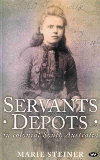Servants depots in colonial South Australia by Marie Steiner

Wakefield
Press,2009. ISBN
9781862548053.
(Ages: Senior
secondary). A sliver of history in the broad sweep of
South Australia's 180 or so years, is taken up in this slim book, to
show us
how women were treated in early SA, and what part the government played
in
their protection. In 1855, shiploads of single women were in assisted
passage
to SA, to find employment and husbands. Surprisingly to me, many were
Irish.
When these women arrived, a depressed harvest in SA meant that there
were few
jobs available and so the government stepped in and provided depots in
Adelaide
initially and then Victor Harbor, Clare, Gawler, Robe, Kapunda, Mt
Barker and
Willunga. These places boarded the women with a matron, and helped them
find
employment. Steiner goes through the running, maintenance and success
of
depots, devoting a chapter to each.
One particular ship, the Nashwauk, which
foundered at Moana Rocks in 1855, and held 163
Irish girls is given close attention. We are told about the women, and
what
happened to each in turn as they found employment and/or husbands, or
travelled
on to Melbourne, hoping for better prospects.
It seems that the government at the time felt
that some care should be taken with these girls, lest they fall into
bad
company and prostitution, so set up these depots where people wanting
employees
could come and talk to the girls. The strict 'boarding house' regime
reflected
the life in the ships they came in, and so I imagine many were very
happy to
get work. But some came back within a few weeks, either the pay was
poor, or
not as much as promised, or the work far too hard, or they found they
were in a
place with no other woman. Many reasons for returning are explained,
and it is
interesting to see the lengths the board (Female Immigration Board)
went in
checking their stories, and in the case of several of the matrons,
retrieving
moneys owed to the girls by employers who dismissed them. A
fascinating look at a small part of our history, this book would be
particularly useful to students of women's studies or the history of
South
Australia.
Fran Knight